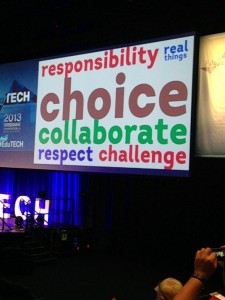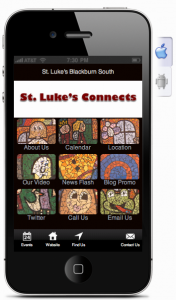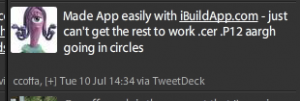Having just returned from two days of educational stimulation and exhaustion at EduTech conference in Brisbane, I wonder; does anyone go to conferences like these seeking answers? Do they arrive bright-eyed at the opening keynotes in anticipation of getting answers to all or even some of their school problems? Are they seeking a clear indication and plan for a future direction? I hope not, as I believe they would come away disappointed. It would be like bobbing for apples in a swimming pool.
The day after I returned, I was asked by my 84 year old dad (non-teaching background), “What was it all about?”. “Well, it was called EduTECH, so it was about Educational technology, but not really, it was more about how we have to change our schools and teaching because of technology.”
Other bloggers have described the content of the sessions in great detail and reflected on how this will impact on their teaching, Kathy Turley and Simon McKenzie to name just two. My note taking was too poor to produce such informative summaries for any readers here. I was letting others on Twitter synthesise the main points and summarise the buzz (thanks to all #edutech contributors and summarised excellently here by Alex Semmens!).
So all I have to share are some of my ponderings :
- The message is that teachers have to change their views of their role. I know we have been hearing “No sage on the stage” for a long time but it is getting louder and louder and more important. Technology is not replacing us, but it should be making us change our tack on our craft.
- Flexibility seems to be one of the most important features of both schools and the teachers working in them. Flexible access to devices, flexible working spaces, flexible timetables, flexible lesson structures, flexible mindsets amongst administrators, teachers and students. Daniel Pink spoke of the power of ‘un-commissioned work’ – this does not happen in a classroom where time pressures are extreme.
- There is a strong push to change, however the reality of the assessment system we send our students towards is a large disincentive for many and excuse for others. The famous Dewey quote; “If we teach today as we taught yesterday, we rob our children of tomorrow’, could perhaps be re-considered; “If we assess today as we assessed yesterday, we rob our children of tomorrow”. What can we do about this major issue?
- Students often don’t get enough credit – many presenters had examples of how amazing things can occur when we loosen the reins, this probably applies to teachers too!

@LaurenBatty01
Overall, I was privileged to be entertained, informed and challenged by the ideas of Dan Pink, Sal Khan, Stephen Heppell, Ewan McIntosh, Alan November, Stephen Harris and Sir Ken Robinson. I was just as excited to hear the story of Star of the Sea School Cleveland and Alice Leung and to chat amongst my colleagues about how any of this can translate into change in our varied workplaces.
In this blogpost, Ewan McIntosh summarises the theory of Guy Claxton; The magnificent eight qualities of powerful learners and he expanded on that in his presentation. The words viewed here might seem like catch-cries without the context but the message was strong.
The ‘big’ conference experience has also left me appreciating more and more the joys I experience at the far more intimate professional learning gatherings hosted by Teachmeet Melbourne. There is so much wisdom in every school community, every local neighbourhood and definitely at every TeachMeet. It is no surprise that we see responsibility, real change, choice, collaboration, respect and challenges at every event.


